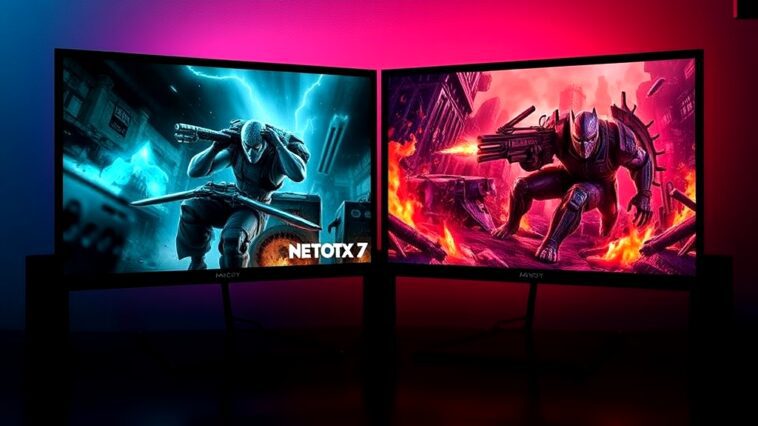In the world of televisions and monitors, the debate around 4K resolution versus 1080p resolution is heating up. I mean, we’ve all heard the buzzwords, right? “Ultra HD,” “Full HD,” and the endless marketing jargon that comes with it—who wouldn’t be confused? So, is upgrading to 4K really worth it? Let’s dive into the nitty-gritty of comparing 4K and 1080p display quality differences, the benefits of upgrading from 1080p to 4K resolution, and a whole lot more.
Understanding the Basics: 4K vs 1080p
First off, let’s break down what 4K and 1080p mean.
- 1080p, or Full HD, has a resolution of 1920 x 1080 pixels. It’s been the gold standard for a while now and offers a decent viewing experience for most casual viewers.
- 4K, on the other hand, or Ultra HD, boasts a resolution of 3840 x 2160 pixels. That’s four times the pixel count of 1080p—kind of a big deal, right?
The Display Quality Differences
When it comes to comparing 4K and 1080p display quality differences, the most noticeable change is the clarity and detail. Watching a movie in 4K is like stepping into a new world. The colors pop, the details are sharper, and the overall experience is more immersive. Just imagine watching your favorite action flick—seeing every little explosion and every nuanced expression on the actor’s face. It’s like you’re right there in the scene!
But hold on a second—does that mean 4K is automatically better? Not necessarily. The difference in quality can depend on a couple of factors, such as:
- The size of your screen: If you’re watching on a small screen, the difference may not be as apparent. Why? Because the human eye can only perceive so much detail from a certain distance.
- Viewing distance: You might be surprised, but if you’re sitting far away from the screen, the extra pixels won’t matter much. You know how it is—sitting way back on the couch, you might not even notice that 4K goodness.
Benefits of Upgrading from 1080p to 4K Resolution
Okay, so let’s get into the juicy stuff—the benefits of upgrading from 1080p to 4K resolution.
- Visual Clarity: This one’s a no-brainer. The clarity you get with 4K is often mesmerizing. Whether you’re watching nature documentaries, movies, or sporting events, the level of detail can be breathtaking. Honestly, I think watching a sunset in 4K is way better than in 1080p.
- Future-Proofing: Investing in a 4K TV now could save you from having to upgrade again in just a few years. At the end of the day, technology keeps advancing, and going for 4K might just keep you ahead of the curve.
- Enhanced Streaming Options: With the rise of streaming services, there’s a growing library of 4K content available. Yes, Netflix, Amazon Prime Video, and Disney+ offer 4K options, so if you’re into binge-watching, this could be a game-changer!
- Better Gaming Experience: For you gamers out there, let’s talk about is 4K worth it for gaming vs 1080p performance. The difference in graphics can be staggering. Imagine playing a game like Call of Duty or The Last of Us II in stunning detail—that’s a whole new level of immersion.
But before you rush out to buy a 4K TV, let’s consider the cost analysis of 4K TV vs 1080p TV purchase.
Cost Analysis: 4K vs 1080p TV Purchase
Now, let’s be real—cost is a big factor for most people. A cost analysis of 4K TV vs 1080p TV purchase shows a significant price jump. While 1080p TVs can be quite affordable, 4K TVs have steadily come down in price over the last few years.
But, you might be thinking, “Is it really worth spending the extra cash?” Well, it depends on your viewing habits. If you’re a casual viewer who enjoys the occasional movie night, a 1080p model might suffice. However, if you’re a tech enthusiast or a gamer who wants the best experience possible, then shelling out for that 4K upgrade could be worth every penny.
The Impact of 4K Content Availability
Speaking of content, let’s talk about the impact of 4K content availability on viewing experience.
Many streaming services have jumped on the 4K bandwagon. But here’s the catch: not all content is available in 4K. So, if your favorite shows or movies are still only in 1080p, you might not feel the need to upgrade just yet.
But if you’re a film buff or you love watching the latest blockbusters, you’ll find that 4K content is becoming increasingly common. Plus, with the advent of 4K Blu-rays and gaming consoles capable of 4K output, your options are only going to expand.
UHD vs HD: Streaming Services and Video Quality Comparison
Now, let’s shift gears and look at UHD vs HD: streaming services and video quality comparison.
Most major streaming platforms, like Netflix, Hulu, and Amazon Prime, have made 4K content available, but there are some caveats. For instance, to stream in 4K, you’ll usually need a subscription to their premium tier—so keep that in mind when budgeting.
And, of course, you’ll need a robust internet connection. Ever wonder why your streaming is buffering? It might be that your internet speed just can’t handle the bandwidth that 4K requires. It’s kinda like trying to fit a square peg in a round hole—just doesn’t work out!
Best 4K TVs for Watching Movies Compared to 1080p Options
So, now that we’ve weighed the pros and cons, let’s consider the best 4K TVs for watching movies compared to 1080p options.
While I can’t give you an extensive list here, I can point out a few standout models:
- LG OLED C1: This beauty combines the deep blacks of OLED with 4K resolution for stunning visuals. Perfect for movie nights!
- Samsung QN90A: Its Quantum Dot technology delivers vibrant colors and excellent brightness—great for bright rooms.
- Sony A80J: Known for its incredible color accuracy and excellent HDR performance.
On the 1080p side, the Samsung TU8000 offers solid performance for a budget-friendly price. Similarly, the TCL 5-Series is a great option for those looking for decent quality without breaking the bank.
Making the Decision
At the end of the day, is upgrading to 4K really worth it? It ultimately depends on your individual needs and viewing habits. If you’re someone who enjoys high-quality visuals and has the budget for it, then absolutely—go for that upgrade!
But if you’re more of a casual viewer, maybe hold off for now. After all, just because something is shiny and new doesn’t mean it’s necessary, right?
Wrapping Up
In conclusion, the debate around 4K vs 1080p is more than just a numbers game. It’s about how you plan to use your TV, what content you enjoy, and how much you’re willing to invest. Plus, with technology evolving so rapidly, staying informed about the latest capabilities can help you make the best decision for your viewing experience.
So, here’s a thought: next time you’re watching your favorite movie or playing your favorite game, think about what kind of experience you want. Whether it’s in 4K or 1080p, just make sure you’re enjoying it. Because at the end of the day, that’s what really matters, right?
And who knows? You might even find yourself appreciating the finer details—be it in HD or UHD. Happy viewing!




